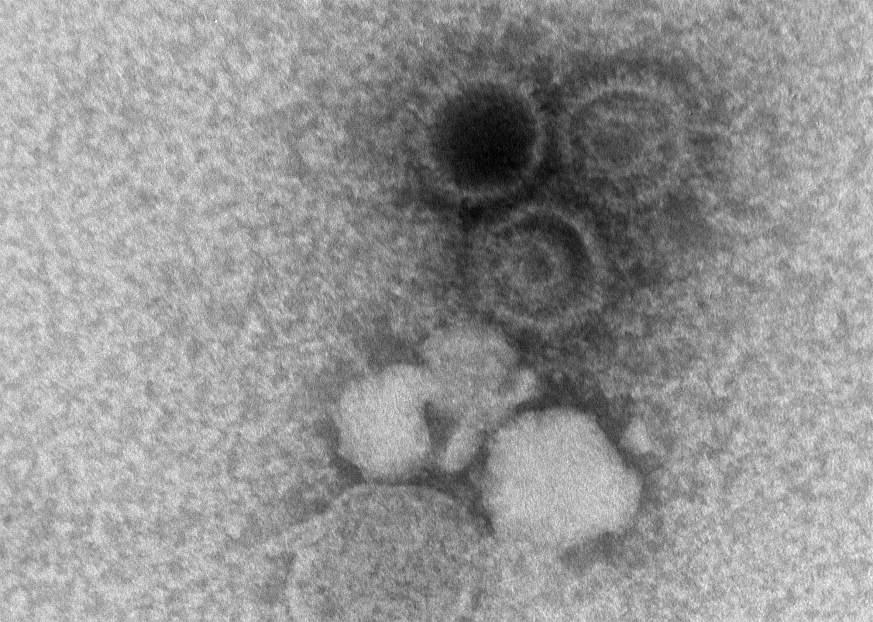Connection between Epstein-Barr Infection, Multiple Sclerosis, and Cancer

Cancer and MS: Epstein-Barr virus manipulates the immune system
The Epstein-Barr virus (EBV) specifically affects the immune system. Researchers from Heidelberg and Lyon were able to demonstrate how it redirects B cells, which then trigger inflammation or promote tumors. This could mean that the virus plays a central role in the development of both diseases.
Most people carry it within them, but hardly anyone notices it: the Epstein-Barr virus (EBV). In Germany, more than 95 percent of people over 50 are infected. In most cases, the infection is silent. In certain cases, the virus can promote serious diseases – such as Burkitt’s lymphoma or stomach cancer. EBV is also increasingly the focus of attention in autoimmune diseases such as multiple sclerosis (MS).
Researchers at the German Cancer Research Center (DKFZ) and the Kidney Center of Heidelberg University Hospital have now discovered a mechanism by which EBV actively spreads in the body: It changes B cells in such a way that they move more, overcome barriers, and migrate specifically into tissue – including the brain. This is made possible by a combination of increased mobility, altered signal processing in the cell, and the attraction of further immune cells. Strikingly, the infected B cells themselves produce the messenger substances that control their mobility.
Virus control with consequences for multiple sclerosis
It is known that EBV can contribute to the development of cancer. The current study now shows that infected B cells develop properties that are normally found in cells that specifically migrate into tissue – so-called homing cells. This is triggered by virus components that activate certain inflammatory messengers. One of these, CCL4, acts like a call and increases the mobility of the cells. At the same time, it makes them susceptible to signals via the CCR1 receptor, which is particularly active in MS. The interaction of these stimuli puts the B cells into a kind of migratory state.
“In cooperation with the Kidney Center of Heidelberg University Hospital, we were able to show that EBV-infected B cells have characteristics of homing cells,” explains DKFZ virologist Professor Dr. Henri-Jacques Delecluse, an internationally recognized expert on the virus. These cells specifically overcome the barrier of the blood vessels and penetrate into various tissues – triggered by the interaction of CCL4 and CCR1. Inside the cells, an enzyme called FAK2 is activated, which additionally drives the movement.
In addition, the infected cells release interleukin-10, which attracts further immune cells – especially those that are also increasingly found in the inflamed brain tissue of MS patients.
Targeted blockade successful in animal experiments
In the so-called mouse model, the research team succeeded in interrupting this process: The active substance Defactinib specifically inhibited the enzyme FAK2, which caused the infected B cells to lose their mobility and viability. The spread in the spleen and brain was stopped. The combination with a CCR1 inhibitor was particularly effective. Defactinib is already in clinical testing and is considered to be well tolerated.
“The decryption of the reaction cascade that puts EBV-infected B cells into homing mode offers the possibility of intervening in a targeted manner and preventing the migration of the B cells,” explains lead author Dr. Susanne Delecluse, nephrologist and research group leader at the DKFZ. “Using specific inhibitors, we were able to reduce the survival rate of EBV-infected B cells and prevent their spread in the body – including into the brain.”
Transferability to humans?
Whether these results can be transferred to humans is still open. The authors write: “Our results provide mechanistic insights into the EBV-induced dysregulation of B cells and suggest that containing their migration could be a possible approach to reducing the pathogenic effect of EBV-infected cells.” Should the mechanism be confirmed, it could help to specifically combat the role of the virus in autoimmune diseases such as MS – and possibly also protect against long-term consequential damage.
The study is entitled “Epstein–Barr virus induces aberrant B cell migration and diapedesis via FAK-dependent chemotaxis pathways” and was published in the journal Nature Communications. In addition to the German institutions, research institutions in Lyon were also involved, including the Université Claude Bernard Lyon 1 and Inserm.
Source: https://www.apotheke-adhoc.de/nachrichten/detail/pharmazie/krebs-und-ms-virus-manipuliert-immunsystem/#
